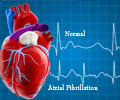Atrial fibrillation is linked to a modest increase in dementia risk, with a stronger effect in individuals diagnosed before age 70.
- Atrial fibrillation increases dementia risk, especially in those under 70
- The risk is higher for early-onset dementia, with a 36% increase
- Age significantly affects the strength of the AF-dementia connection
Atrial fibrillation diagnosed in midlife is linked to a 21% increased risk of dementia at any age and a 36% higher risk of early-onset dementia
Go to source). The authors, including Dr. Julián Rodriguez García from the Bellvitge University Hospital in Barcelona, Spain, describe this as the largest European population-based study to examine the link between AF and dementia. They emphasize that the association was particularly strong for early-onset dementia in younger individuals.
Atrial fibrillation, characterized by an irregular heartbeat, is a common condition affecting 2-3% of the general population, with prevalence increasing as people age. Some studies have suggested a direct link between AF and dementia, while others have been less conclusive. The researchers believe that understanding the subgroups most affected could provide valuable insights into the underlying causes of this association and help inform targeted prevention strategies.
The presence of #atrial_fibrillation more than doubles the risk of developing #dementia after #stroke. #heartdisease #medindia’
Exploring the Catalan Population for Dementia Risk
This new study focused on the relationship between AF and dementia in the Catalan population of Spain. It included individuals aged 45 and older, who were free from dementia at the start of the study in 2007. The researchers utilized anonymized data from the System for the Development of Research in Primary Care, which includes information on over 80% of Catalonia's population. The follow-up period spanned from 2007 to 2021.Weak but Statistically Significant Link Between AF and Dementia
The study observed 2,520,839 people over an average period of 13 years. At baseline , 79,820 individuals (3.25%) had been diagnosed with AF. In multivariable analyses, AF was shown to have a weak but statistically significant association with an increased risk of dementia, with a 4% higher risk overall.However, age played a crucial role in the strength of this link. Among younger individuals aged 45-50, those with AF were 3.3 times more likely to develop dementia compared to those without AF. In contrast, no significant association was found in people over 70. These results suggest that the risk of dementia associated with AF diminishes as people age.
Stronger Dementia Risk in Younger AF Patients
Further analysis confirmed that the link between AF and dementia weakened in older adults, with the connection losing statistical significance in those over 70. In contrast, younger patients diagnosed with AF before age 70 exhibited a 21% increased risk of dementia, with the risk for early-onset dementia rising by 36%.The authors explain that dementia is often a multifactorial condition with a variety of neurological causes, which could explain why AF appears to have a stronger impact in younger individuals. In older adults, other factors such as age-related neurodegeneration may diminish the relative effect of AF.
Silent Strokes and Other Factors Contributing to the Risk
The researchers also considered the role of stroke in the relationship between AF and dementia. After excluding participants with a history of stroke, AF still showed a significant association with increased dementia risk, particularly for early-onset dementia. This suggests that factors other than stroke, such as silent strokes or microinfarcts, may be at play.In addition to silent strokes, the authors highlight other potential mechanisms linking AF to dementia, such as changes in blood flow and pressure (hemodynamic changes), autonomic dysregulation, and inflammation. These factors could contribute to damage in the brain’s small blood vessels, a condition often associated with dementia. The authors also suggest that inflammation caused by AF may further exacerbate the risk of developing dementia.
The study points out the importance of addressing the association between atrial fibrillation and dementia, particularly in younger patients. The researchers suggest that early detection and proactive management of AF in younger individuals could potentially reduce the risk of dementia and alter the disease’s progression.
Reference:
- Atrial fibrillation diagnosed in midlife is linked to a 21% increased risk of dementia at any age and a 36% higher risk of early-onset dementia - (https://www.escardio.org/The-ESC/Press-Office/Press-releases/Atrial-fibrillation-diagnosed-in-midlife-is-linked-to-a-21-increased-risk-of-dementia-at-any-age-and-a-36-higher-risk-of-early-onset-dementia)
Source-Medindia















